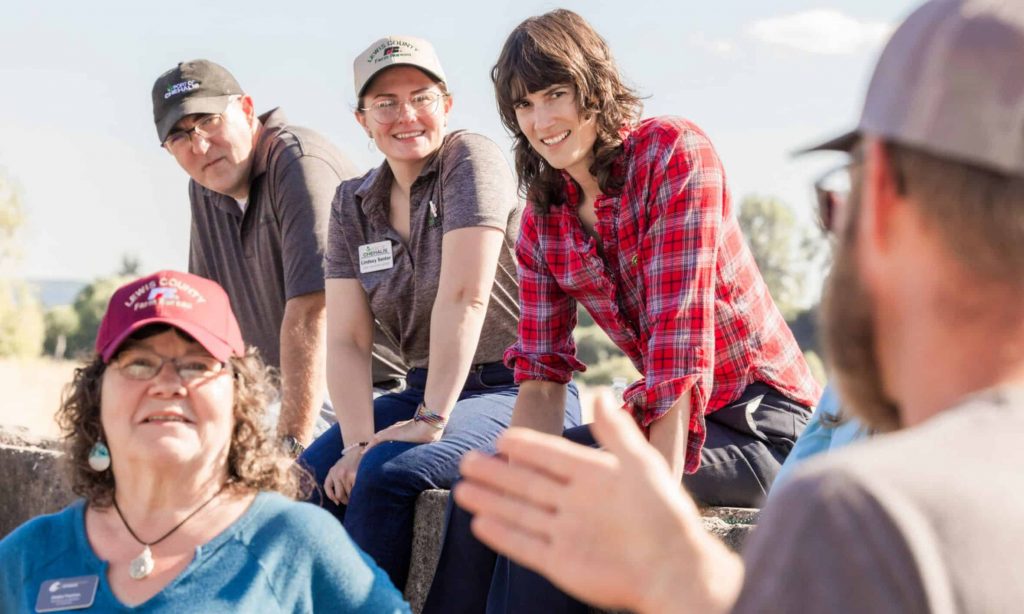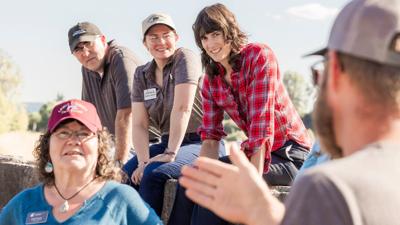As many of them said during a six-farm tour with state, federal and county lawmakers on Monday hosted by the Lewis County Farm Bureau, the work takes grit, fiscal responsibility, stewardship and understanding of the land.


As many of them said during a six-farm tour with state, federal and county lawmakers on Monday hosted by the Lewis County Farm Bureau, the work takes grit, fiscal responsibility, stewardship and understanding of the land.
It also helps that they’re often out standing in their fields.
In a Greyhound bus, members of several local organizations joined U.S. Rep. Marie Gluesenkamp Perez, D-Skamania, Lewis County Commissioners Scott Brummer and Lindsey Pollock, 19th District state Reps. Jim Walsh, R-Aberdeen, and Joel McEntire, R-Cathlamet, along with lawmakers hailing from across the state to visit one farm in Toledo and five in the rural Chehalis/Adna area.
The congresswoman pet a dairy calf at the Styger family’s dairy farm on Tune Road and most of the tourgoers received a hat and goodie bag with hazelnuts, soap, honey and information — one treat from each farm.

But the tour wasn’t held to bask in the glory of the area’s resources and eat delicious treats. Organized by Farm Bureau President Maureen Harkcom as the first full-scale tour by the group since the start of COVID-19, it was a chance for lawmakers to connect with the people who make up the backbone of a rural economy. With inflation, a brain drain of local kids leaving family farms, taxes on simple repairs for farming equipment, Chehalis River flooding and an increasingly-consolidated market, Lewis County’s crop and livestock caretakers had issues to share at every stop.
They weren’t griping, necessarily, but matter-of-factly sharing increased difficulties as some of the last local farmers still in the area. Where there were previously more than 100 dairy farms, for example, the county currently has about one dozen.
Still, the trait shared by all the farmers in Western Washington’s most spacious county, according to Dennis Styger, a founding member of the Southwest Washington Grain Co-Op, is love. The co-op, through a partnership with the Port of Chehalis, has been a cost-saving way for local farmers to sell and transport grain out of the county.
“It’s been a blessing on me to watch this co-op, a bunch of men put their heads together to make something. I never imagined it to be the point it is today,” Dennis Styger said, later adding, “That was just five farmers trying to figure out what we’re gonna do to stay in the business that we love. This is about love. This ain’t about money. It ain’t. It’s about surviving in the business that we love.”
The grain cooperative is one of many ways the county’s farmers have adapted to dwindling local resources and the buying power of corporation-owned farms.
Dave Fenn, whose family has farmed along the South Fork for 110 years, said one “significant issue” local agriculture faces is market consolidation.
Three grocers sell more than half the groceries in the United States, Fenn said, and four meat processors process about 80% of the country’s meat.
“That consolidation, they all want to deal with bigger and bigger enterprises, they don’t want to deal with small farms,” Fenn said.
Styger said strict regulations from the Department of Ecology caused many of his biggest headaches. When one state representative asked him if he could send a list of specific regulations that bother him, Styger simply laughed.
For Dan Maughan, a beekeeper whose property saw 11 feet of water in the 2007 flood, one challenge working in a global supply chain is seeing pure honey get cut with sugar water and sold at lower prices.
“Sometimes they are rice syrup, sometimes they are corn syrup. As they go to another nation, most times, they get more syrup, they cut it much like they would with drugs,” Maughan said. “Then, after sending it around the world — I mean really, it does — it might go from India to Mexico to Europe and then get sold back to us as ‘European honey.’ And we have to compete with that and it sells here as a cheaper price.”
Maughan makes 60% of his income from beekeeping by loaning the insects for pollination and the other 40% from selling honey. While the Himalayan blackberry is categorized as a noxious weed and a pest to many, he said it makes for some delicious honey. In the winter, he drives his more than 300 hives to California to help pollinate almond fields.
Maughan’s honey is sold at the Adna Grocery Store, Jeremy’s Market and Jeremy’s Farm-to-Table, and the Farm Store in Chehalis.
Maughan is on the Office of Chehalis Basin’s Local Alternative Non-Dam committee, also called the LAND committee and is a member of the local pro-flood control organization “OneVoice.”
“I just want to see flooding gone,” Maughan said, which sparked argument between some attendees.
The most vocal was Katherine Humphreys, owner of hazelnut-growing Ceres Farms, the tour’s previous stop before Maughan’s farm.
Humphreys said she didn’t believe the Chehalis and Quinault Tribes would ever approve Lewis County Flood Zone Control District’s proposed flood retention facility upriver from Pe Ell, and said if they did, she didn’t think the design would benefit her land, anyways.
“That’s not their game,” Humphreys said of the tribes. “Write it in the paper! … They’re flexing and saying, ‘No.’ I don’t hear a Republican of Democrat that will stand up against them.”
Brummer, who, as a county commissioner, also sits on the flood zone district, stepped in and said the various entities involved are working together whether or not they agree.
“Through cooperation and collaboration. Chehalis is not saying ‘No,’” Brummer said, referring to the tribe’s approval for further study on the facility.
Edna Fund, a former county commissioner and current board member on the Office of Chehalis Basin board, echoed this, saying she felt progress had been made for fish and flooding thanks to the Department of Ecology’s Chehalis Basin Strategy, regardless of what action is taken toward a flood retention structure.
When the tour joined Tune Road’s Organic Valley dairy farm, owned by a different-but-related set of Styger family members, they heard a different view on flooding. Andy and Linda Styger, third generation farmers, have been working to pass the dairy to a fourth generation: their son, Shane and daughter-in-law Jamie, who are also starting a family of their own.
Andy Styger said there is no way to fully stop flooding on the Chehalis River, but added that the valley is as lush as it is because of the river’s unwieldiness. Without any flooding, he worried the valley would be full of warehouses.
He and his family love their land on Tune Road, which looks down at the Willapa Hills Trail as it runs between the Newaukum and Chehalis Rivers. In the fall and winter, the fields below them fill with water, bringing ducks and geese.
But, passing the land and the farm to Shane and Jamie Styger has been more difficult than they could have imagined. Due to the high costs of equipment and the high cost of repairs, the younger couple couldn’t afford to buy the farm machinery. The family created a special deed allowing Andy and Linda to live on the property for the rest of their lives, for Jamie and Shane to help care for the duo in their golden years, and for the elder couple to slowly step back from farm labor.
The deal was also struck with the approval of Shane’s sisters, one of whom, Samantha (Styger) Manguson, is the owner of Lewis County Coffee Company.
Without “the robots,” as they call the farm’s automated milkers, Shane Styger said he wouldn’t have returned to his family’s farm.
Chuckling, he called his work day “banker hours” compared to most dairy farmers.
“I don’t wake up ‘til 7 a.m.,” he said.
The Stygers were among the first dairy in Lewis County to get the equipment. Previously, all milking was done by hand. The family members said it doesn’t necessarily make the farm more productive, but saves money and time that would be spent on labor and all that comes with it, such as sick days and overtime.
But, according to Linda Styger, they’re lemons. In the last few years, they’ve spent thousands on repairs for the machinery and, recently, she was audited by the IRS for not paying taxes on the repairs as “farm upgrades.”
“So, if you went out and bought new, benefitting the manufacturers, you don’t pay taxes on it — that’s an expense. But if you take it to your local shop and get some work done, you’re going to pay taxes on it?” asked Gluesenkamp Perez in an incredulous tone.
The Congresswoman, who lists right-to-repair legislation among her biggest focuses, brought up John Deere tractor company and its highly-elite repair set up as a similar anecdote. The Stygers, though, said they simply buy different color tractors. Linda Styger said she and Andy have been meeting with the Dairy Federation and plan to fight the repair tax issue, noting their farm often needs up to $30,000 worth of repairs in a year.
“The reality is that farming isn’t that lucrative a career,” Shane Styger said. “You’re not doing it for the money. … It is a lifestyle. You’re here seven days a week.”
Linda Styger then chimed in, “It’s a great way to raise a family.”
Legal notice about Intellectual Property in digital contents. All information contained in these pages that is NOT owned by eDairy News and is NOT considered “public domain” by legal regulations, are registered trademarks of their respective owners and recognized by our company as such. The publication on the eDairy News website is made for the purpose of gathering information, respecting the rules contained in the Berne Convention for the Protection of Literary and Artistic Works; in Law 11.723 and other applicable rules. Any claim arising from the information contained in the eDairy News website shall be subject to the jurisdiction of the Ordinary Courts of the First Judicial District of the Province of Córdoba, Argentina, with seat in the City of Córdoba, excluding any other jurisdiction, including the Federal.
1.
2.
3.
4.
5.
eDairy News Spanish
eDairy News PORTUGUESE
